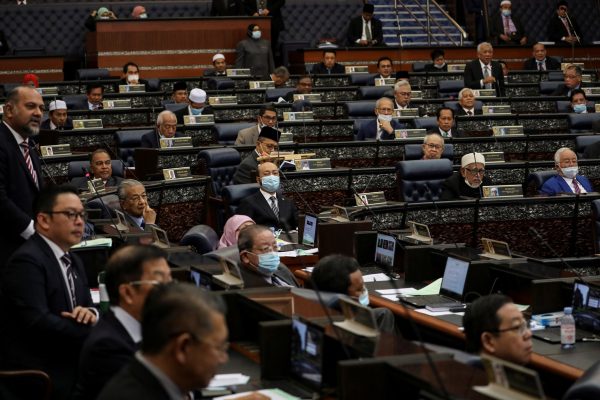With the ruling coalition’s legitimacy built on an unstable house of cards, every bill to be introduced in parliament can turn into a battle of wills between the government and the opposition. Without a clear political consensus, it is unclear how the country will move forward. Even if a snap election is called, the possibility remains that it could result in a hung parliament.
After a long spell under the hegemonic rule of the previous Barisan Nasional (BN) regime, Malaysians have grown accustomed to the idea of political stability — but they may need to accept weak governments as the ‘new normal’. Before a two-coalition system emerged in 2008, BN was a durable electoral authoritarian regime built on the back of a highly-cohesive grand coalition of 13 political parties that maintained a super-majority for decades.
A factor that contributed to the BN regime’s stability was its position between the two extremes in Malaysia’s ethnic politics. The opposition was divided with the Pan-Malaysian Islamic Party (PAS) on its right and the predominantly Chinese but multiracial Democratic Action Party (DAP) on its left. Located on opposing sides of the racial divide, they had limited appeal beyond their respective Malay-Muslim and Chinese constituencies.
But the sacking of Anwar Ibrahim as Deputy Prime Minister and the establishment of his Reformasi movement in 1998 changed the political equation. Together with Anwar’s People’s Justice Party (PKR), PAS and DAP gradually moved away from their ethnic flanks and became political allies twice — from 1999 to 2001 and again from 2008 to 2015.
When PAS ended its relationship with DAP in June 2015, the progressive faction in the former broke away and eventually spawned a new political entity called National Trust Party (PAN) to continue working with the latter under Pakatan Harapan (PH) coalition. Having a strong opposition coalition was such an effective strategy that it eventually ushered in a peaceful democratic transition for Malaysia in the 2018 general election.
Both BN and PH are primarily electoral pacts that allow member parties to conduct pre-election seat negotiations with each other to prevent vote-splitting. Under Malaysia’s first-past-the-post electoral system, there can only be one winner based on plurality in all of its 222 single-member parliamentary districts.
While electioneering issues are comparatively easy to settle, ideological differences are more complicated. Even though a regime change has occurred, the ethnic factors that divide Malaysians remain the same. When Mahathir Mohamad was at the helm, PH was supposed to forge a new political middle ground — but the problem was no party was located further left. Until a more radical liberal party emerges in Malaysia, PH will always occupy this half of the equation in a two-coalition system.
The ‘centre’ envisioned by some PH leaders is also being torn apart by controversies relating to the International Convention on the Elimination of All Forms of Racial Discrimination (ICERD), Islamic preacher Zakir Naik, and the introduction of Jawi (Arabic scripts) lessons in vernacular schools. As United Malays National Organisation (UMNO) and PAS have moved further right, PH leaders are naturally perceived as liberals due to their multiracialism even if they may not qualify from a purely Western ideological perspective.
Still, coalitional politics is more complicated than party rhetoric. Despite PN being trumpeted as a Malay-Muslim government, UMNO also has its share of Western-educated liberals who may not see eye-to-eye with PAS. While forming a new alliance with PAS, UMNO has not given up its previous political arrangement with the Malaysian Chinese Association and the Malaysian Indian Congress under BN.
Besides a liberal-conservative dichotomy, the centre-periphery cleavage is becoming more prominent — and the Bornean states’ regional parties may play a counterbalancing role in PN. While the Sarawak Parties Coalition (GPS) and United Alliance Sabah (GBS) support PN now, their loyalty is contingent on many factors. Sabahan and Sarawakian politicians have always claimed that their states are marginalised. Now, they can push for more federal funds and political autonomy.
Under the current political configurations, PAS will also face a hard time getting its religious bills passed in parliament if the Bornean lawmakers in PN — many of whom are Christians — decide to oppose them. All three GBS lawmakers in the ruling coalition are Christians, and one is the son of a former cabinet minister who spoke out forcefully against the implementation of Sharia laws in Malaysia. Despite news reports that GPS is more comfortable working with PAS than DAP, nearly half of GPS’s 18 MPs are non-Muslims who will likely check the Islamist agenda.
In a nutshell, there are two broad scenarios for Malaysia moving forward. The first is rebuilding a grand coalition buttressed by repression against opponents. But backsliding into authoritarianism will betray the previous struggles for institutional reforms. The second option is normalising weak governments that are unable to implement long-term policies and to properly mediate ethnic, religious and regional contentions. The biggest challenge is finding a way to reconcile democracy with regime stability.
Kevin Tan is a PhD candidate at the University of Nottingham Malaysia.

